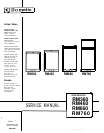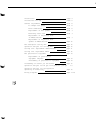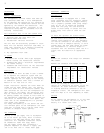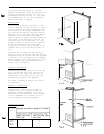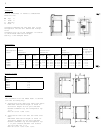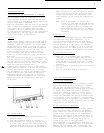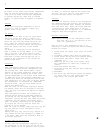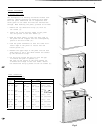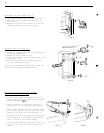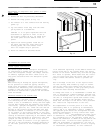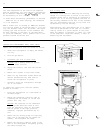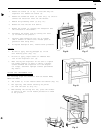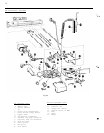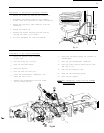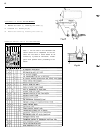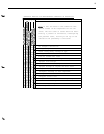
7
be stored in the frozen food storage compartment.
They can then be stored about three times as
long as in the fresh food storage compartment.
To prevent drying out, keep food in covered
dishes,
in plastic bags or wrapped in aluminum
foil.
CAUTION
Do not store explosive substances in the re-
frigerator,
such as cigarette lighter gas,
petrol,
ether or the like.
Ice Making
Ice cubes can be made in the ice trays which
should be filled with water to within
l/4"
(5 nun) from the top. To release the ice cubes
seize the tray with both hands and twist the
tray. Cubes not required should preferably
be replaced in the tray. Refill the tray with
water and replace the tray on the freezer
shelf.
Ice making is accelerated if the thermostat
knob is turned to setting "MAX". It is a good
idea to do this a few hours before an anti-
cipated need for ice but be sure to turn the
knob back to normal setting when the ice is
formed or the foodstuffs in the cabinet may
become frozen hard.
Defrosting
Some refrigerator models are equipped with an
automatic defrosting device incorporated with
the cooling unit. This device makes a quick
defrost of the finned evaporator section about
once a day without affecting the frozen food
storage compartment or the frozen foods contained
in. When the frozen food storage 'compartment is
covered with frost the refrigerator must be shut
down temporarily till the frost is melted. Before
the refrigerator is restarted the compartment
should be dried,
the ice trays washed and re-
filled with fresh water.
When the frost on the finned evaporator section
has melted, water will be collected in the drip
tray. The drip tray should be emptied at regular
intervals.
Some refrigerators without the automatic de-
frosting device should be defrosted regularly'
by turning off the refrigerator. Empty the re-
frigerator leaving the drip tray under the finned
evaporator and the cabinet and freezer doors
open. If desired, defrosting may be speeded up
by filling the ice tray with hot water and
placing it in the freezer.
When all frost is melted, empty the drip tray and
dry the interior of the refrigerator with a
clean cloth.
Replace the drip tray and ice tray, replace all
food stuffs and set the thermostat to "MAX" for
a few hours. Then reset the thermostat knob to
its normal position.
To Shut Down the Refrigerator
To shut down the refrigerator temporarily set
the thermostat to off and turn off the gas tap.
If the cabinet is not in operation over a period
of weeks,
it should be emptied and cleaned and
the door left ajar. The ice trays should also
be dried and kept outside the cabinet.
Cleaning
To clean the interior lining of the refrigerator
use lukewarm weak soda solution. The evaporator,
ice trays and shelves must, however, be cleaned
with warm water only. Never use strong chemicals
or abrasives to clean these parts or the pro-
tective surface will be spoiled. It is important
always to keep the refrigerator clean.
Periodic maintenance
NOTE: Before working on the refrigerator, make
sure that 110 V A. C. and optional 12 VD.C.
leads are disconnected.
Once or twice a year depending on use, it is
necessary to clean and adjust the burner assembly.
Proceed as follows:
1.
2.
3.
4.
5.
6.
7.
8.
9.
Loosen screw and remove cover plate for burner
housing.
Disconnect lighter cable from the electrode.
Loosen burner fixing screw and withdraw burner.
Clean burner tube with a brush. Blow with
compressed air.
Screw off jet and clean with alcohol. Blow
with compressed air. Never use a needle or
similar.
Clean flue baffle and flue.
Clean the cooling unit and the floor under the
refrigerator.
Reassemble.
The entire gas installation should be checked
for leaks. Test all pipe connections with
soapy water,
not with an open flame.



